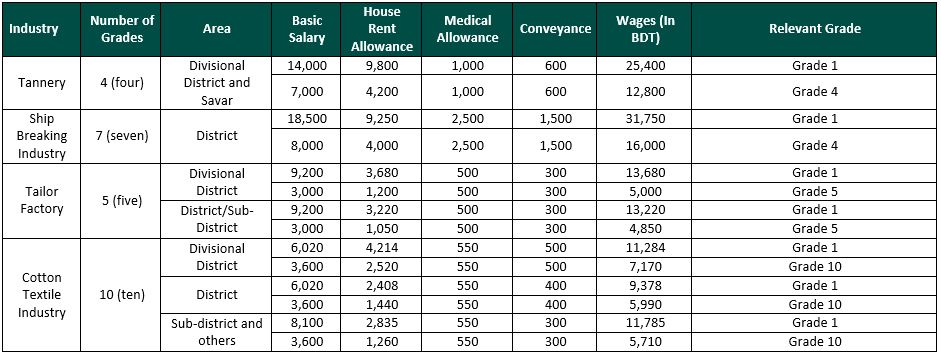Regional Legal Update on Labor and Employment Law Issues
DFDL’s Employment Practice Group is dedicated to advising clients on employment and labor issues and preparing human resources documentation compliant with local law. Our employment team’s in-depth knowledge of the law and practices in the countries in which we operate allows us to provide specialized, tailored, and practical advice on issues that arise in employment relationships. Our Head of the Regional Employment Practice Group is Danyel Thomson, now based in Bangkok, who has been with DFDL for ten years having previously in our Laos and Myanmar offices. This legal update is to advise you on important legislation and employment issues in the region.
Bangladesh
The ministry of labor and employment (“MOL”) of Bangladesh has a separate wing called the ‘Minimum Wages Board’ (“MWB”) which is responsible for proposing and setting out minimum wages for workers employed in different sectors.
Under Section 139 of the Bangladesh Labor Act 2006, the Minimum Wages Board must initially submit a proposal to the MOL with a proposed fixed minimum rate for basic salary, rent allowances, medical allowances, and conveyance allowances (“Wages”). If approved, the MOL will publishe an official gazette notifying the approved new Wages, which become applicable to all relevant sector workers.
In 2018, MOL published the following four approved gazette notifications related to minimum Wages. These were for workers employed under different grades in the tannery industry, tailoring factories, ship breaking, and the cotton textile Industry. A summarized overview of these gazette notifications are as follows:
Tannery industry: Under S.R.O. No. 64/2018 dated 27 February 2018 while prescribing the minimum wages ranging from BDT 13,500 to a maximum of BDT 25,400 for Tannery activities situated within divisional districts of Bangladesh, and the minimum prescribed rate for tannery activities situated within other locations ranges from BDT 12,800 to BDT 24,000.
Tailoring factory: Under S.R.O. No. 90/2018 dated 24 March 2018 the minimum wage for workers in a tailoring factory located at any divisional district ranges from BDT 5000 to BDT 13,680, and wages for factories located in districts and sub-districts, will be from BDT 4,850 to BDT 13,220.
Ship breaking industry: Under S.R.O. No. 52/2018 dated 11 February 2018 the minimum wage for workers working in the ship breaking industry ranges from BDT 16,000 to BDT 31,750.
Cotton Textile Industry: Pursuant to the S.R.O. No. 116/2018 dated 3 May 2018 minimum wages have been categorized into three parts namely, based upon the location of the relevant industry, divisional district, district, sub-district and other locations. There are two schedules; for schedule A divisional districts, the minimum wage is BDT 7,170 and a maximum of BDT 11,284. For districts, the minimum wage ranges from BDT 5,990 to BDT 9,378. Moreover, for sub-districts and other locations wages will be BDT 5,710 to BDT 8,977. For schedule B, divisional districts, the minimum wage is between BDT 7,170 to BDT 14,820. For districts, the minimum wage is from BDT 5,990 to BDT 12,290. Finally, for sub-districts and other locations, wages will be from BDT 5,710 to BDT 11,785.
A breakdown of the abovementioned minimum and maximum wages is provided below:
![]()
Similar to the above, the government has prescribed minimum wages with a detailed breakdown for all workers of all grades.
In addition to the above, MWB has submitted their proposed minimum wage for workers in the following sector(s): automobile workshops; bakeries, biscuits and confectionary manufacturing; and the aluminium and enamel industry, subject to approval from the MOL.
Cambodia
While the minimum wage is guaranteed under the Labour Law for the purpose of ensuring a decent standard of living compatible with the human dignity of employees, currently there is only a mandatory minimum wage specially determined for workers in the textile, garment, and footwear sectors. Under Prakas No. 396 on the Determination of Minimum Wage for Workers in Textile, Garment and Footwear Sectors for 2018 dated 5 October 2017, a monthly minimum wage for workers in these sectors is USD 165 for probationary workers, and USD 170 for regular workers.
The Ministry of Labour and Vocational Training (“MLVT”) has prepared a draft law on a minimum wage for workers covered by the provisions of the Labour Law (“Draft Law”). According to the latest version available to the public, a tripartite National Council on the Minimum Wage (“NCMW”), comprised of the government, employer representatives and employee representatives, will be established to conduct studies and research, and provide recommendations for the determination of minimum wage levels and other benefits for persons covered by the Labour Law. Subject to the discretion of the NCMW, key factors to determine the minimum wage include social considerations (such as family status, the inflation rate, and living expenses); and (2) economic considerations (such as productivity, competition, job market status and profitability of the industry). The discussion on minimum wages by the NCMW must be undertaken annually (unless otherwise decided by the NCMW) and in accordance with the procedures as set out in the Draft Law.
Upon the enactment of the Draft Law, based on the NCMW’s recommendation, the minimum wage will be determined by a Prakas (i.e. a ministerial edict) issued by the MLVT and must take effect from 1 January of the year. The MLVT may set the priority of the scope of implementation for minimum wages in accordance with economic activities, profession, occupation or region based on the economic and social status of the country following receipt of recommendations by the NCMW. Any agreement, whether made verbally or in writing, that provides a minimum wage level lower than that determined by the MLVT, will be null and void.
Following the third public tripartite consultation, the Draft Law was approved by the Council of Ministers on 25 May 2018 and was included on the agenda for discussion at the Permanent Committee of the National Assembly since 29 May 2018. It will then be forwarded to the National Assembly for a full discussion and adoption.
The Lao PDR
The Prime Minister’s Office issued Notification (№ 560/PMO, 20 April 2018) (“Notification 560”) increasing the monthly minimum wage in the Lao PDR from LAK 900,000 (USD 108) to LAK 1.1 million (USD 132). The increase took effect on 1 May 2018, thereby coinciding with International Labor Day celebrations. Per local media and our understanding of the discussions leading up to the announcement, the increase comes in response to an increase in the cost of living and a need to improve the livelihood of workers.
‘Minimum wage’ is not defined under Notification 560, however, according to previous legislation, the Instruction on the Amendment of the Minimum Wage of Employees Working in Business Areas (№ 808/MLSW, 9 Feb 2015) (“Instruction 808”), ‘minimum wage’ refers to the minimum amount of salary or wages payable to employees, working up to: 26 days per month; 6 days per week; and 8 hours per day, to guarantee a basic standard of living in the Lao PDR. The minimum wage excludes any other payments which may be due to employees including: overtime payments; bonuses; welfare payments; incentives; and food, lodging, or transportation allowances (if any). For employees who earn wages based on production, the amount paid to such employees may not be lower than the minimum wage then in force.
With regard to the scope of application, Instruction 808 specifically applied to business units across all socio-economic sectors with the notable exception of international organizations, which were regulated separately under the Decree on Management of Local Staff Working for International Organizations in Lao PDR (No. 456/PM, 1 November 2010) (the “International Organization Staff Decree”). Per this Decree, the monthly minimum wage for local employees of international organizations was higher than that of business sector employees subject to Instruction 808: LAK 1 million (USD 120) for manual labor and LAK 2 million (USD 240) for skilled labor. From our verbal inquiries with the Lao PDR labor authorities, Notification 560 applies to all employers. Indeed Notification 560 states that the increase is generally for “labor in the Lao PDR”.
Myanmar
The National Committee for setting the Minimum Wage issued Notification 2/2018 establishing an increased daily minimum wage of MMK 4,800 (approximately USD 3.60), for an eight-hour workday. The increased minimum wage does not apply to small businesses with less than ten workers and family businesses.
Notification 2/2018 replaces Notification 2/2015 which established the last daily minimum wage of MMK 3,600 (approximately USD 2.70). The setting of the minimum wage in 2015 adhered to the process established by the 2013 Minimum Wage Law and Rules. The process involves numerous meetings and discussions among the relevant national, regional, and state committees, along with employer and employee organizations, workshops, and other consultations. The previous minimum wage of MMK 3,600 per day did not apply to small businesses with less than 15 employees and family businesses.
Initially proposed in January 2018, an increased minimum wage has been discussed in the manner required by the 2013 Minimum Wage Law in the months since then. Employer and employee organizations have submitted their input, ultimately leading to the issuance of Notification 2/2018. This sets a minimum wage uniformly applicable throughout the country, regardless of the work type or location.
Notification 2/2018 is effective as of 14 May 2018.
Thailand
Current Regime on Workplace Privacy
As of the time of writing, the right to privacy is enshrined in the Constitution and is recognized and implemented through industry specific legal requirements relating to privacy protection and IT security obligations. Examples include the Financial Institution Business Act 2008 and the Telecommunications Business Act 2001. There are several new obligations and offences in the sector-specific rules, rights under the Thai Civil and Commercial Code (“CCC”), and the Thai Penal Code.
In general, workplace privacy violations may be challenged by an injured party as tort actions in accordance with the provisions of the CCC. This is where there is unlawful wrongdoing, unauthorized disclosure, or leaking of personal information thereby causing damages to employees. Under the Thai tort law, employees are burdened with having to prove both causation and the extent of actual damages suffered resulting from the wrongful act in question. This is due to the practice of Thai Courts in determining remedies and compensation based on direct or foreseeable consequences of the wrongful act. Criminal actions on the ground of defamation or illegal disclosure of secrets may be separately pursued. As a form of best practice, employers in Thailand should obtain consent through the use of the employers’ IT system by specifically requesting acceptance from employees with regard to the employer’s privacy and data collection policy (including the acceptance of the use of CCTV monitoring, or monitoring of an employee’s computer usage or online activities) prior to granting him or her a laptop or personal computer.
Current Legal Developments on Data Privacy
On 8 May 2018, the Thai Ministry of Digital Economy and Society released the latest draft of the Personal Data Protection Bill (the “PDPB”). The PDPB’s submission to the Thai Cabinet for approval is still pending. If approved in its current form, the PDPB will come into force one year after being officially published in the Royal Gazette [1].
In the draft PDPB, the overarching pre-requisite for any kind of personal data collection, usage or disclosure by data controllers [2] or data processors [3] alike, is consent. The prescribed methods by which consent can be recorded are in writing or through electronic means, unless impossible to do so. To request consent from data subjects, the data controller would be mandatorily required to notify data subjects of the specific purpose for any personal data collection, usage, or disclosure prior to or at the time of collecting such data [4]. Data subjects would be vested with the right to withdraw such consent at any point in time, and the data controller would be obliged to notify the data subject in the case that such withdrawal would materially affect the data subject [5]. A notable exception to the requirement of having to obtain prior consent is data sought per the terms agreed to under a contract or during the performance thereof. Unauthorized personal data collection, usage or disclosure, and associated penalties thereto under the draft PDPB would apply to individuals and juristic persons acting as ‘data controllers’ or ‘data processors’ across Thailand, and potentially abroad [6].
It remains unclear at this stage as to the extent to which the above requirements re: the collection, usage, and disclosure of employees’ personal data would apply. Similarly, the draft law is somewhat ambiguous as to the limits to which employers may rely on exceptions to consent in the context of contractual and statutory obligations. The development of the PDPB would be one of the key pieces of legislation to significantly impact business operators, not only from the perspective of internal management of the workforce, but also from the viewpoint of maintaining customer relationships.
Vietnam
DFDL Contact
![]()
Danyel Thomson
Head of our Regional Employment Practice Group
Danyel.Thomson@dfdl.com
[1] Section 2 of PDPB
[2] “Data controller” means an individual or juristic person who has the authority to decide on the collection, use or disclosure of personal data; Section 6 of PDPB)
[3] “Data processor” means an individual or juristic person who manages the collection, use or disclosure of personal data as authorized by data controllers; Section 6 of PDPB
[4] Section 17 and 20 of PDPB
[5] Section 17 of PDPB.
[6] The PDPB shall apply to data controllers or data processors abroad, if the collection, use or disclosure of personal data has been conducted by those data controllers or data processors located outside of Thailand, in which they intend or foresee the consequences of such actions that will eventually occur in Thailand. (Section 5 paragraph two of PDPB)
The post ASEAN Employment Legal Update 2018 #Q2 appeared first on DFDL.

































